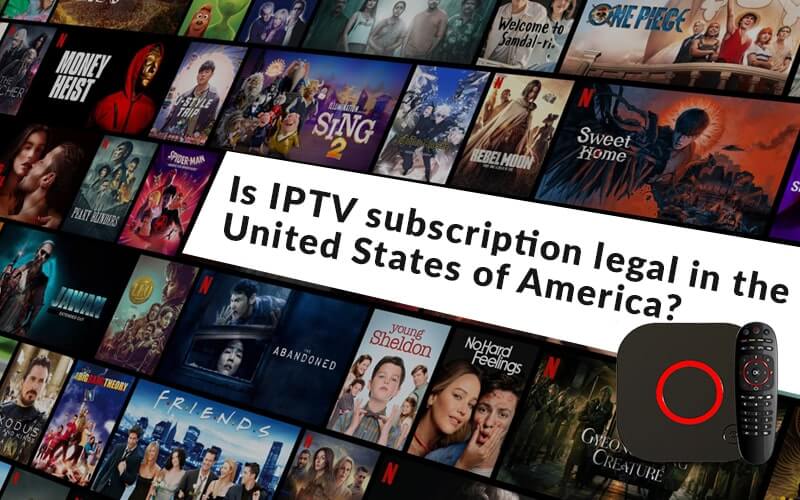Free Express Shipping

IPTV, or Internet Protocol Television, has become very popular in the last few years across the world. It has offered viewers an additional means of watching television, but on the internet. But as more and more people are using IPTV services, there are concerns about whether it is okay to use IPTV subscriptions in the US and if it is legal.
In this blog, we will know more about IPTV and see if it is allowed in the USA. We will also look at the rules for illegal IPTV, how to tell if a service is legal or illegal and if it’s a good idea to use the ones that might not be lawful.
Internet Protocol Television, or IPTV for short, is a system that uses the internet to transmit television programming rather than more conventional means like cable or satellite. This allows people to watch TV shows and other forms of content on different devices like computers, laptops, smart phones, and smart TVs.
IPTV is popular because it is easy to use, doesn’t cost much, and has a ton of channels and on-demand videos to choose from. Because IPTV subscriptions let you watch content on different devices and choose from a lot of shows, many people find them interesting.
Using IPTV, you can watch your favorite shows anytime and anywhere. Certain service providers even allow you to record live TV, rewind any missed segments of a show, and even store it for viewing later at your convenience. The nicest thing is that it is far less expensive than cable.
The legal standing of IPTV in the US is a complicated and evolving matter. Although IPTV technology is legal, the broadcasted content might not necessarily be. Reputable and legal IPTV services make sure they abide by copyright rules by obtaining the required licenses and permissions before broadcasting content. However, a lot of unapproved service providers share copyrighted content without permission, which creates legal issues.
Before purchasing an IPTV United States subscription, the users should investigate whether an IPTV service has the necessary licenses and complies with copyright laws to ascertain its legality.
If you use IPTV services like Guru IPTV, Indian IPTV, Punjabi IPTV Channels, Tashan TV, Boss IPTV, and Vois IPTV that are properly licensed, you are doing everything legally and by the rules.
In the USA, a number of regulations control the sharing and use of copyrighted material, and IPTV services are subject to these rules. One important piece of legislation that handles copyright infringement in the digital age is the Digital Millennium Copyright Act (DMCA). IPTV services that distribute copyrighted content without permission risk legal action under the Digital Millennium Copyright Act (DMCA).
Moreover, government agencies such as the Federal Communications Commission (FCC) and the Department of Justice (DOJ) pursue criminal charges against unlicensed IPTV providers. When using IPTV services, law enforcement agencies stress how important it is to follow copyright regulations. They concentrate on both the service providers and users who are involved in copyright infringement.
It can be difficult to distinguish between legal and illegal IPTV service providers because the illegitimate service providers often go to great lengths to seem authentic. However, there are some points that users can look for to determine the legality of an IPTV service:
Licensed IPTV United States service providers acquire required licenses to lawfully broadcast content. It is recommended that users verify if a service has the required permissions from content providers before making a purchase decision.
A service provider offering an exceptionally large variety of content may be violating copyright laws by streaming content that they are not allowed to stream. Thus, it would be wise to exercise caution if you come across an IPTV service provider that offers far more than you would anticipate.
Very cheap IPTV subscription costs can indicate to an unlicensed service. Reputable IPTV providers make infrastructure and licensing investments, which allows them to charge fair prices for their services without going too low.
Checking customer feedback and reviews might reveal information about the reliability of an IPTV service provider. If a service receives a lot of bad feedback about legal matters, proceed with caution.
Using illegal IPTV services puts consumers and the entire sector at serious risk. If users violate copyright, they may be subject to fines and legal actions by regulatory bodies. Supporting illegal services also damages the content creation sector by failing to pay creators fairly for their effort and hard work.
Using illegitimate IPTV services is not advised from a moral or legal perspective. Selecting trustworthy IPTV service providers ensures copyright compliance, supports content creators, and lessens the likelihood of legal repercussions.
Internet Protocol Television (IPTV) has completely changed the way we consume entertainment in the modern digital age. The way we watch TV series, movies, and live sporting events has radically changed as a result of this technology’s ability to distribute enticing information via the internet. It offers outstanding convenience and accessibility at reasonable prices and hence, has become the preferred choice of people across the globe.
However, some people are tempted to use illegal IPTV services because they want to watch cool stuff without paying a fair amount which is not a good idea and has several demerits.
So, the next time you consider exploring IPTV services, make the responsible choice and choose a legal service that supports copyright, values content creators, and provides a legal and genuine entertainment experience. By choosing a legal IPTV service provider, you can help in the continued evolution of the IPTV industry.
Yes, availing illegal IPTV services can lead to legal issues, including fines and potential legal action for copyright infringement.
Look for licensing and permissions, assess the variety of content offered, consider pricing, and check user reviews.
Look for licensing and permissions, assess the variety of content offered, consider pricing, and check user reviews.